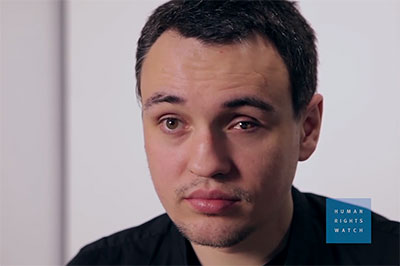Russian gay propaganda law fuels anti-LGBT violence

LGBT activist Dmitry Chizhevsky lost his sight in an eye in a homophobic attack (see video report below)
Russia has been accused of allowing a wave of violence against LGBT people, fuelled by the country’s federal gay propaganda law.
“I felt blood in my mouth, but only later learned that the attackers had broken my jaw in two places. They took me to a nearby empty yard and asked me, ‘So how are we going to fix this?’ ‘We could break your arms and legs, or…’ I understood that they wanted money…. Before they let me go, they asked me, ‘Do you know what people have always done to gays in Russia? They impaled gays!’”
That’s the testimony of Zhenya Zh (not his real name), one of the victims of an anti-LGBT vigilante group documented by Human Rights Watch in a new report released on Monday.
The 85-page report, License to Harm, is based on dozens of detailed interviews with LGBT people and activists in 16 cities across Russia who experienced attacks or aggressive harassment because of their sexual orientation or gender identity.
LGBT people described being beaten, abducted, humiliated, and called “paedophiles” or “perverts,” in some cases by homophobic vigilante groups and in others by strangers on the subway, on the street, at nightclubs, at cafes, and in one case, at a job interview.
“Violence experienced by LGBT people in Russia is unmistakably motivated by homophobia, but the authorities deliberately ignore that these are hate crimes and fail to protect victims,” said Tanya Cooper, Russia researcher at Human Rights Watch.
Most of those interviewed said that these problems intensified since 2013, when the propaganda law was passed. In some cases, they were attacked by the anti-LGBT vigilante groups that appeared in dozens of Russian cities and towns in late 2012. These groups of radical nationalists lure gay men and teenage boys on the pretext of a fake date, hold them against their will, and humiliate and expose them by videotaping the encounter. Hundreds of such videos depicting abuse have been posted online.
In other cases, LGBT people described being physically attacked by strangers during their everyday activities. Victims told Human Rights Watch that assailants followed them and in many cases hit them, while accusing them of being gay, calling them “faggots,” and hurling homophobic slurs at them in public places.
LGBT activists also face physical violence and harassment at public events supporting LGBT equality. The vast majority of LGBT activists interviewed had been attacked at least once during public pro-LGBT events since 2012, describing attacks in several cities. They said that the police consistently fail to take adequate measures to prevent the attacks and protect them from violence.
Out of 78 victims of homophobic and transphobic violence and harassment interviewed for the report, 22 did not report attacks against them to the police because they feared direct harassment from police and did not believe the police would take the attacks seriously.
“Russian law enforcement agencies have the tools to prosecute homophobic violence, but they lack the will to do so,” Cooper said. “The failure to stop and punish homophobic violence and aggression puts LGBT people and their supporters at further risk of attack.”
Aside from several isolated investigations, the authorities have done little to hold attackers accountable.
Human Rights Watch found that although Russia has hate crime laws, not a single case documented in the report was investigated as a hate crime. When police did open criminal investigations, they were dismissive and reluctant to investigate effectively, often blaming victims for the attacks.
Only three of the 44 cases in which victims filed a police report led to a prosecution. At least two of the attackers in these cases were convicted but their sentences did not correspond to the gravity of harm to the victims, said the group.
Instead of publicly denouncing anti-LGBT violence and rhetoric, Russia’s leadership has either remained silent or – in some cases – engaged in explicit anti-LGBT hate speech, Human Rights Watch found.
In several cases, LGBT people or supporters of LGBT rights working as educators in schools, universities, or community centres for children became targets of smear campaigns organised to demonise them and portray them as a threat to children solely because of their sexual orientation. Most of them lost their jobs.
The 2013 law bans “propaganda of non-traditional sexual relations among minors.” Violating the law is an administrative offence punishable by a range of fines.
“The anti-LGBT “propaganda” law doesn’t protect anyone, but it does give homophobes a convenient reason to believe LGBT lives matter less to the government,” Cooper said. “The Russian government should repeal the law and stop discrimination against Russia’s LGBT citizens.”
Leave a Reply